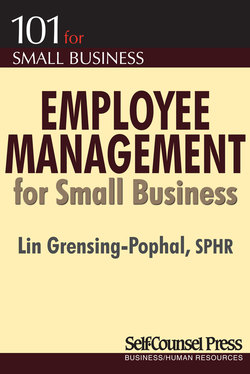Читать книгу Employee Management for Small Business - Lin Grensing-Pophal - Страница 36
На сайте Литреса книга снята с продажи.
1. The Best Person for the Job
ОглавлениеChris wanted to hire a new sales associate to sell power tools. He ran an advertisement for a salesman in the local paper, interviewed only male applicants, and when asked why he was discriminating against women, he seemed surprised. “I’m not discriminating against women — what do they know about power tools?”
Chris is not alone in his attitudes. These kinds of misconceptions and biases are prevalent, even in today’s supposedly enlightened hiring environment. Unfortunately, some of these attitudes are so ingrained that many employers don’t even realize that they are making biased decisions.
Your goal when filling any position is to find the best person for the job. By definition, the best person is the one who most closely meets the qualifications for the position. Qualifications refer to objective characteristics of the job applicant — not personal characteristics (e.g., sex, age, and race).
To avoid falling victim to unintentional bias, you must carefully and consistently do two things:
(a) Specifically identify the knowledge, skills, and abilities needed to do the job.
(b) Measure all candidates objectively against the criteria you have established.
Keeping the goal of hiring the best person foremost in your mind as you select employees can help you avoid legal problems.
Employers tend to get into trouble when they let personal opinions and biases interfere with hiring decisions. “I don’t feel comfortable working with men.” “Older employees are stubborn and will be difficult to manage.” At best, these stereotypes can lead you to overlook a qualified candidate. At worst, they can land you in court.
To avoid trouble, be objective and realistic about the qualifications needed for the job. You should ask yourself the following questions:
• What is the primary reason for the job?
• What is difficult about the job?
• How much supervision is provided?
• What types of people must the new employee get along with?
• What technical knowledge or experience is required?
As you develop questions, or as you speak with job candidates, be careful that the questions you ask are all related directly to the qualifications required for the position. Even during small talk you should avoid any questions of a personal, non-job-related nature.
What are some examples of questions that are inappropriate (or illegal)? Any question that seeks an answer unrelated to the qualifications required to perform the job. For instance:
(a) Are you married? How does marital status affect a candidate’s ability to perform? It doesn’t. Therefore, any questioning along these lines is inappropriate — and illegal. An employer might argue that “a married employee will be more reliable.” If your concern is about whether the employee will be at work regularly, ask about past attendance history. Focus on specific issues that you can relate directly to performance and avoid relying on misconceptions or prejudice.
(b) Do you plan to have children? Again, some employers defend questions about children, or plans to have children, by saying that they are concerned the employee may miss a lot of work. A better way to address this concern is to ask, more specifically, “Are there any reasons that you would not be able to meet the work hour requirements of this position?”
(c) How old are you? Why does age matter? Your questions should focus on skills, abilities, or experience — age is irrelevant.
Before interviewing any job candidate, ask yourself: What are the requirements of the job? Keep this thought for most in your mind and you will be in a better position to avoid inappropriate lines of questioning — and potential legal problems.
